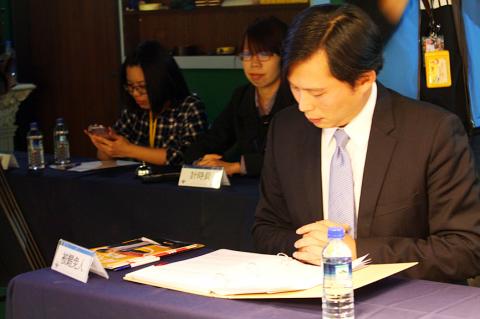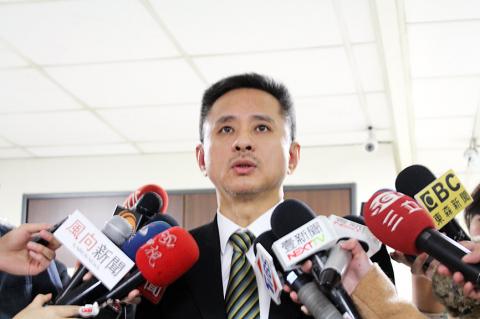The New Taipei City Election Commission yesterday held a televised debate between New Power Party (NPP) Executive Chairman Huang Kuo-chang (黃國昌) and Sun Chi-cheng (孫繼正), chairman of the Greater Taipei Stability Power Alliance, a group opposed to gay marriage, over the second round of voting for the legislator’s recall scheduled for Dec. 16.
Sun criticized Huang for supporting amending of the Civil Code to legalize gay marriage and said it would destroy values that are intrinsic to families, adding that this was his primary reason for launching the recall effort against Huang.
More than half of New Taipei City residents are opposed to the proposed amendments, as well as 60 percent of all Taiwanese, Sun said.

Photo: Chiu Shu-yu, Taipei Times
There is neither legal nor public consensus on the issue, but Huang insists on “pushing it through,” Sun said, adding that such actions go against Huang’s touted belief that “people should determine public policies.”
Huang’s actions have gone against his campaign promise to make “the next generation happier,” Sun said.
Using his daughter’s school textbook, Sun said that its contents, such as sections on masturbation, fellatio and anal sex, are not only inappropriate, but absurd.

Photo: Chiu Shu-yu, Taipei Times
Such material drives students toward sexual liberalism, making them susceptible to orgies, sadism and masochism, threesomes and more, Sun said, adding that it was inappropriate handling of the subject of sexual education.
Sun called on constituents in the city’s Sijhih (汐止), Jinshan (金山), Wanli (萬里), Juifang (瑞芳), Pingsi (平溪) and Gongliao (貢寮) districts to vote and witness how their votes would become a milestone in Taiwan’s governance.
Huang said he respects that people oppose same-sex marriage out of religious beliefs, adding that he had not verbally abused Christians and called on everyone to respect different opinions.
Citing the Council of Grand Justices’ Constitutional Interpretation No. 748 in May, Huang said that same-sex marriage has been declared a basic human right and by law, the Legislative Yuan has to conclude the amendments within a two-year period.
Public issues must be based on facts and common sense, and should be in line with the law, Huang said, adding that those who spread hateful commentaries are themselves the source of social instability.
Huang thanked the public for its support and said that he has not disappointed his supporters since his election, adding that the televised debate was due to the amendments to the Civil Servants Election and Recall Act (公務人員選舉罷免法).
His attendance at legislative affairs, including inquiries and budget reviews, was in accordance with his campaign promises, Huang said.
Rejecting Sun’s claim that he has not tended to the needs of his constituents, Huang said he has asked the Taiwan Railway Administration (TRA) to ameliorate and improve the crowded conditions on Siko TRA Station platforms near the Sijhih Science Park.
Huang also said he was involved in the environmental assessment of a planned extension of the Taipei MRT System into New Taipei City’s Sijhih District (汐止), adding that all of his actions are recorded on the publicly viewable platforms associated with the Legislative Yuan.
The debate is positive for the deepening of democracy in Taiwan, Huang said.
According to the recall act, the recall vote — the last of three phases — needs the approval of at least 25 percent of the total eligible voters in an electoral district to be considered successful.
Huang’s constituency, the 12th electoral district of New Taipei City, has 251,191 eligible voters, requiring 62,798 “yes” votes to remove the NPP lawmaker from his post.

Taiwan is to commence mass production of the Tien Kung (天弓, “Sky Bow”) III, IV and V missiles by the second quarter of this year if the legislature approves the government’s NT$1.25 trillion (US$39.78 billion) special defense budget, an official said yesterday. Commenting on condition of anonymity, a defense official with knowledge of the matter said that the advanced systems are expected to provide crucial capabilities against ballistic and cruise missiles for the proposed “T-Dome,” an advanced, multi-layered air defense network. The Tien Kung III is an air defense missile with a maximum interception altitude of 35km. The Tien Kung IV and V

The disruption of 941 flights in and out of Taiwan due to China’s large-scale military exercises was no accident, but rather the result of a “quasi-blockade” used to simulate creating the air and sea routes needed for an amphibious landing, a military expert said. The disruptions occurred on Tuesday and lasted about 10 hours as China conducted live-fire drills in the Taiwan Strait. The Civil Aviation Administration (CAA) said the exercises affected 857 international flights and 84 domestic flights, affecting more than 100,000 travelers. Su Tzu-yun (蘇紫雲), a research fellow at the government-sponsored Institute for National Defense and Security Research, said the air

A strong continental cold air mass is to bring pollutants to Taiwan from tomorrow, the Ministry of Environment said today, as it issued an “orange” air quality alert for most of the country. All of Taiwan except for Hualien and Taitung counties is to be under an “orange” air quality alert tomorrow, indicating air quality that is unhealthy for sensitive groups. In China, areas from Shandong to Shanghai have been enveloped in haze since Saturday, the ministry said in a news release. Yesterday, hourly concentrations of PM2.5 in these areas ranged from 65 to 160 micrograms per cubic meter (mg/m³), and pollutants were

Taiwan’s armed forces have established response protocols for a wide range of sudden contingencies, including the “Wan Chun Plan” to protect the head of state, the Ministry of Defense (MND) said today. After US President Donald Trump on Saturday launched a series of airstrikes in Venezuela and kidnapped Venezuelan President Nicolas Maduro, concerns have been raised as to whether China would launch a similar “decapitation strike” on Taiwan. The armed forces regularly coordinate with relevant agencies and practice drills to ensure preparedness for a wide range of scenarios, Vice Minister of National Defense Hsu Szu-chien (徐斯儉) told reporters before a